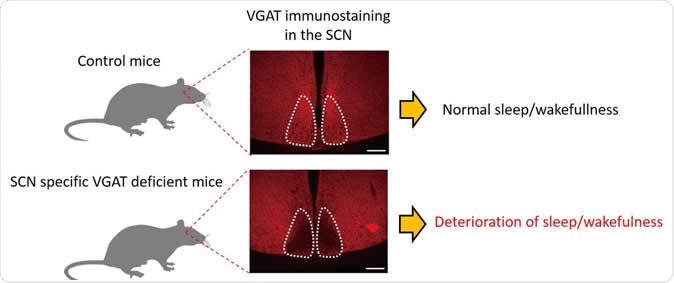Researchers from Graduate School of Medicine, Nagoya University, Hokkaido University Graduate School of Medicine and Gunma University Graduate School of Medicine have collaborated to uncover the role of GABA-ergic neurons or the inhibitory neurons in the functioning of the central circadian clock of the body.
Study leaders were Dr. Daisuke Ono, Prof. Akihiro Yamanaka, Prof. Ken-ichi Honma, Prof. Sato Honma and Prof. Yuchio Yanagawa. They write the GABA neurons seem to be affecting the circadian clock that is located in the suprachiasmatic nucleus (SCN). Their study titled, “GABA in the suprachiasmatic nucleus refines circadian output rhythms in mice,” was published in the latest issue of the journal Communications Biology.

AAV mediated VGAT deficiency in the SCN deteriorates circadian behavioral rhythms. Image Credit: Nagoya University
The researchers write, “In mammals, the circadian rhythms are regulated by the central clock located in the hypothalamic suprachiasmatic nucleus (SCN), which is composed of heterogeneous neurons with various neurotransmitters. Among them an inhibitory neurotransmitter, γ-Amino-Butyric-Acid (GABA), is expressed in almost all SCN neurons, however, its role in the circadian physiology is still unclear.” They added that the SCN contains over 20000 neurons and fires repeatedly throughout the day for various functions related to the circadian rhythm.
The team explains that sleep wake cycles or the circadian rhythms of the body as well as the hormonal changes throughout the day and regulation of diurnal and nocturnal body temperatures are all regulated by the SCN using the circadian rhythms. The SCN is also responsible for other physiological actions and behaviours. This new study shows that there is a role of inhibitory neurons on the SCN and the circadian rhythm. The team explains that this finding is vital because it could lead to development of therapy for various diseases and disorders that are associated with the disruptions of the circadian rhythm.
The team explained that the SCN plays a vital role in the circadian rhythm by generating signals that leads to the oscillations during the 24 hours day. They write that the SCN comprises of several types of neurons that release neurotransmitters or chemical messengers including γ-Amino-Butyric-Acid (GABA). GABA has been found in SCN in previous studies but the role was unclear till now.
For this study the team used biologically engineered mice that lacked a vital enzyme called the GABA synthesizing enzyme or vesicular GABA transporter (VGAT) or another enzyme glutamate decarboxylase (GAD). The team then studied the firing of the neurons in the SCN throughout the day. They found that the mice that did not have the VGAT or lacked in GABA had a disrupted circadian rhythm. In addition the presence of GABA also allowed for intracellular bursts of calcium ions. The deficiency of VGAT, the team wrote, was responsible for spikes in GABA in SCN belonging to fetal mice. This was not seen in adult mice.
To study the circadian or diurnal rhythms the team placed the mice in two states – “light–dark (LD) cycles” or “constant darkness (DD) cycles”. After three weeks of LD the mice were transferred to DD. Mice are more active in the dark. The team wrote, “The amount of behavioral activity in the dark period of the LD cycle was reduced in the SCN-VGAT depleted mice and the subjective day–night difference in the activity was also reduced under DD.” The team wrote, “These results suggest that a lack of GABA function in the SCN deteriorates circadian behavioral rhythms.”
The authors wrote in conclusion that GABA the inhibitory neurotransmitter was responsible for suppression of the bursts of neuron firing in the SCN and also allows for release of intracellular calcium ions. They wrote however that GABA was not useful, “for the generation and stability of the molecular circadian oscillation in the SCN.” They concluded, “The GABA network may refine the circadian firing rhythm to ensure noiseless communications with neurons outside the SCN.”
The study was funded by the Uehara Memorial Foundation, The Nakajima Foundation, GSK Japan Research Grant 2015 and other agencies.
Recent related study by the same authors
A few months back, in 2018, Ono and colleagues published a similar study titled, “Role of GABA in the regulation of the central circadian clock of the suprachiasmatic nucleus,” in the Journal of Physiology and Science. In this study the team developed methods to study the role of GABA on the SCN and the circadian rhythm.
The team wrote that GABA shows both “excitatory and/or inhibitory characteristics” depending on the phase of the circadian rhythm or the area of the SCN. They wrote that GABA, “can both synchronize and destabilize cellular circadian rhythms in individual SCN cells.” The team outlined the different methods that could be used to study the circadian rhythm as well as the effects of GABA and the SCN.
Journal reference:
GABA in the suprachiasmatic nucleus refines circadian output rhythms in mice, Daisuke Ono, Ken-ichi Honma, Yuchio Yanagawa, Akihiro Yamanaka & Sato Honma, Communications Biology, volume 2, Article number: 232 (2019), https://www.nature.com/articles/s42003-019-0483-6